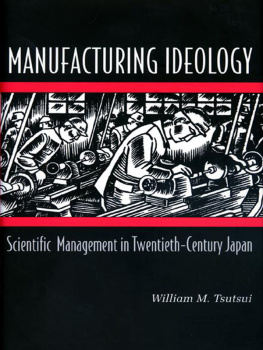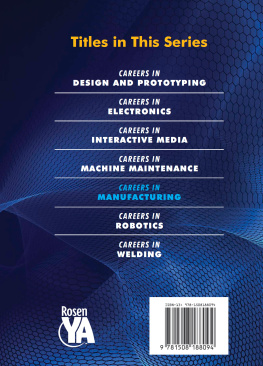Tsutsui William M. - Manufacturing Ideology
Here you can read online Tsutsui William M. - Manufacturing Ideology full text of the book (entire story) in english for free. Download pdf and epub, get meaning, cover and reviews about this ebook. year: 2013, publisher: Princeton University Press, genre: Politics. Description of the work, (preface) as well as reviews are available. Best literature library LitArk.com created for fans of good reading and offers a wide selection of genres:
Romance novel
Science fiction
Adventure
Detective
Science
History
Home and family
Prose
Art
Politics
Computer
Non-fiction
Religion
Business
Children
Humor
Choose a favorite category and find really read worthwhile books. Enjoy immersion in the world of imagination, feel the emotions of the characters or learn something new for yourself, make an fascinating discovery.
- Book:Manufacturing Ideology
- Author:
- Publisher:Princeton University Press
- Genre:
- Year:2013
- Rating:5 / 5
- Favourites:Add to favourites
- Your mark:
- 100
- 1
- 2
- 3
- 4
- 5
Manufacturing Ideology: summary, description and annotation
We offer to read an annotation, description, summary or preface (depends on what the author of the book "Manufacturing Ideology" wrote himself). If you haven't found the necessary information about the book — write in the comments, we will try to find it.
Manufacturing Ideology — read online for free the complete book (whole text) full work
Below is the text of the book, divided by pages. System saving the place of the last page read, allows you to conveniently read the book "Manufacturing Ideology" online for free, without having to search again every time where you left off. Put a bookmark, and you can go to the page where you finished reading at any time.
Font size:
Interval:
Bookmark:

MANUFACTURING IDEOLOGY
MANUFACTURING IDEOLOGY
SCIENTIFIC MANAGEMENT IN
TWENTIETH-CENTURY JAPAN
William M. Tsutsui
PRINCETON UNIVERSITY PRESS PRINCETON, NEW JERSEY
Copyright 1998 by Princeton University Press
Published by Princeton University Press, 41 William Street,
Princeton, New Jersey 08540
In the United Kingdom: Princeton University Press,
Chichester, West Sussex
All Rights Reserved
Library of Congress Cataloging-in-Publication Data
Tsutsui, William M.
Manufacturing ideology : scientific management in twentieth-century Japan / William M. Tsutsui.
p. cm.
Includes bibliographical references and index.
ISBN 0-691-05808-3 (cloth : alk. paper)
1. Industrial engineeringJapan. 2. Industrial managementJapan.
I. Title.
T55.77.J3T78 1998
658.009520904dc21 97-48505 CIP
This book has been composed in Times Roman
Princeton University Press books are printed on acid-free paper and meet the guidelines for permanence and durability of the Committee on Production Guidelines for Book Longevity of the Council on Library Resources
http://pup.princeton.edu
Printed in the United States of America
10 9 8 7 6 5 4 3 2 1
For My Mother
Contents ________________________________________________
Preface ________________________________________________
Librarians were essential to the writing of this study.
One afternoon in the autumn of 1991, I was sitting in the lobby of the National Diet Library in Tokyo, waiting for a few more dusty volumes on factory management to be brought up from the closed stacks. My spirits were not high, as my research appeared to have hit a dead end. Exploring the diffusion and application of Scientific Management (also known as Taylorism) in twentieth-century Japanese industry had once seemed such a promising and timely topic. Yet over the preceding few weeks, a string of Japanese scholars had warned me that my project was pure folly, that American models like Scientific Managementcharacterized by a cold, mechanistic rationalityhad had little influence on the evolution of Japanese-style work practices. My Japanese adviser had similar worries: he had gently suggested on several occasions that I switch to a safer study like a company history or biography of a businessman. Even nonexperts found my project woefully misguided. Everyone knows, the teenaged daughter of my Tokyo landlord once informed me, that we Japanese learned all our management secrets from the Germans.
With such sobering admonitions echoing in my head, I waited dejectedly for my books to be delivered. As the minutes dragged by, I beganfor the first time in many months of visits to the Diet Libraryto observe the staff working behind the large circulation desk. Each of the librarians was engaged in a specific task: one officiously collected book orders, another brusquely called out the names of readers whose materials were ready, a third checked out the books, while yet another gathered and organized the returns. Even in my disheartened mood I could see the fundamentally Taylorite nature of this work routine. With each job standardized, specialized, and simplified, the librarians worked with daunting efficiency, processing books and paperwork with almost mechanical regimentation. Even without the obligatory time-and-motion expert, stopwatch in hand, this seemed a virtually textbook example of classic Scientific Management in action.
And yet, as I watched closely, I began to see that the library staff did not entirely fit the familiar stereotype of the Taylorized worker, the slave of the assembly line sentenced forever to repeating a single, mind-numbing task. Indeed, the librarians changed jobs at regular intervals: every thirty minutes, in a kind of bureaucratic musical chairs, each member of the crew shifted to a different station behind the desk. Over the course of a workday, each librarian thus rotated through all of the jobs in the circulation department.
Here surely was something that lay beyond the traditional Scientific Management paradigm. By reducing worker monotony while maintaining high productive efficiency, the librarians system appeared to offer real relief from the dehumanizing grind of the Taylorized workplace. At the same time, the system seemed as much an intensification of Taylorism as an escape from its excesses: instead of performing one simple, repetitive task, the librarians were expected to undertake a series of equally mindless clerical functions. Was this Taylorism transformed or Taylorism perfected?
I left the library that day in 1991 assured that tracing the history of Scientific Management in Japan was a far more worthwhile project than I had been advised. I hope that this book will bring home to its readers what an afternoon at a circulation desk brought home to me: that an appreciation of Japans Taylorite heritage is essential to understanding the contemporary phenomenon of Japanese-style management. In any case, to the efficient (and inspiring) staff of the National Diet Library, I extend my profuse thanks.
Without the encouragement and assistance of many other individuals, this study would never have come to fruition. I am particularly indebted to Sheldon Garon, whose knowledge and guidance have been invaluable throughout this project. His unfailing enthusiasm has made my work easier; his incisive comments have made my work better. I owe special thanks as well to Marius Jansen, whose generosity and good humor made the long process of research and writing far less harrowing than it might have been. Miles Fletcher, Andrew Gordon, David Howell, and Kent Calder all suffered through the manuscript at various stages in its evolution: their careful readings and many suggestions for improvement have immeasurably enriched this work. Among the many Japanese scholars who gave unsparingly of their time and expertise, I wish to thank Watanabe Osamu, Sugayama Shinji and, above all, Nakamura Masanori, my long-suffering sponsor at Hitotsubashi University. I would also like to express my appreciation to past and present colleagues in the Department of History at the University of Kansas, especially Dan Bays, John Dardess, Grant Goodman, Cappy Hurst, and Tom Lewin: their patience and support have been extraordinary. Bill Towns helped me sharpen my thinking on the contributions of W. Edwards Deming to the quality control movement. Beth Tsunoda provided me with a variety of useful sources, including a copy of her insightful dissertation on the rationalization movement. Brigitta van Rheinberg of Princeton University Press guided this book through the publication process with boundless enthusiasm, energy, and expertise. Madeleine Adams and Gavin Lewis saw this book through production and copyediting with meticulous care and professionalism. Funding for my research in Japan was provided by the Japan-U.S. Educational Commission (Fulbright Program) and for that, needless to say, I am extremely grateful.
Portions of the Paternalist Paradigm in Japanese Industrial Management, Business and Economic History 26, no. 2 (Winter 1997): 56172. I thank the Society for Japanese Studies and the Business History Conference for permission to use this material.
On a more personal note, my thanks go to my cousin, Tsutsui Shigeo, who put up with many annoying requests during my year in Japan, and to Selina Man, who made Princeton and Tokyo warmer places. The ability of my wife, Marjorie Swann, to find split infinitives, holes in my arguments, and humor in the darkest moments has sharpened my work and buoyed my spirits throughout this project.
Next pageFont size:
Interval:
Bookmark:
Similar books «Manufacturing Ideology»
Look at similar books to Manufacturing Ideology. We have selected literature similar in name and meaning in the hope of providing readers with more options to find new, interesting, not yet read works.
Discussion, reviews of the book Manufacturing Ideology and just readers' own opinions. Leave your comments, write what you think about the work, its meaning or the main characters. Specify what exactly you liked and what you didn't like, and why you think so.








